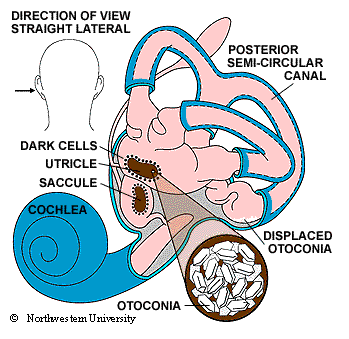Updated – 18th May 2021
Do you get dizzy and feel the room is spinning at times when you roll over in bed or turn your head quickly? Do you get dizzy when you look to the side while driving or walking? There are many causes of vertigo and dizziness, however the cause could be from your inner ear such as BPPV.
BPPV stands for Benign Paroxysmal Positional Vertigo and is a common condition which presents in the adult population, particularly in people over the age of 40 although it can also affect younger people. BPPV is the most common cause of vertigo, which can be defined as a false sense that the room is spinning.
As its name suggests key features of BPPV are as follows:
- Benign – it’s not life threatening and is fixable
- Paroxysmal – it occurs in short, sudden spurts and doesn’t occur without movement
- Positional – it is experienced with certain movements, depending on the position a person’s head moves into
- Vertigo – it results in a false sense of movement, commonly causing a person to feel like the room is spinning
What are the causes of BPPV?
The inner ear is made up on 3 semi-circular canals and special fluid moves along these canals. The canals have special receptors which detect the fluid movement and send signals to the brain to let a person know where they are in space and give a sense of their positioning.
In BPPV, dislodged crystals (otoconia) get stuck in the semi-circular canals and disrupt the normal fluid movement through the canals which sends false signals to the brain to tell a person they are off-balanced and causes vertigo.

The following are common everyday causes of vertigo from BPPV:
- Rolling in bed
- Getting out of or into bed
- Head turns
- Looking up
- Head check while driving the car
What are the key symptoms of BPPV?
- Dizziness/Vertigo – this starts after the head moves to a certain position and usually settles shortly after once still again
- Nausea – some patients may find they feel sick and like they are going to vomit
- Feeling light-headed
- Balance issues – feeling unsteady on one’s feet
Can BPPV be fixed?
The vertigo experienced from BPPV can be very debilitating and severe or can simply be an annoying moment or two of vertigo when rolling in bed. Either way, the good news is that BPPV is fixable!
Initially, your physiotherapist will perform a series of tests to determine the cause of dizziness by looking at your movements and your eyes.
If it is determined that you have BPPV, treatment will aim to re-position the crystals through a series of specific therapist guided movements. You should experience a significant reduction in the level of vertigo experienced within the first session. If your vertigo is severe, consultation with your GP can be useful and prescription of a specific motion sickness medication to reduce the dizziness and/or nausea can be beneficial.
Your physiotherapist will then teach you how to work through special exercises based on which canal is affected eg Brandt-Daroff exercises. These are a series of movements to continue help correcting the problem from home.
Usually, 2-3 treatment sessions help to fix the issue. Some patients may have had vertigo from BBPV for years and years and simply through completing the right treatment, have complete resolution of their symptoms within a few sessions, helping to greatly improve their quality of life.
What next?
Don’t keep putting up with having vertigo and feeling dizzy! See your physiotherapist, who can help accurately diagnosis and treat the cause of the problem. You’ll sleep and feel better and be better able to enjoy life to the full.
PS. If you don’t have vertigo but know someone who complains about feeling dizzy at times, be a good friend and refer them to a physiotherapist for assessment. I guarantee, they’ll thank you afterwards!
Our Physios are on hand for advice and assessment – appointments are available by calling 5535 5218.
Gold Coast Physiotherapy and Allied Health at Burleigh Heads and Broadbeach
References:
Benign Paroxysmal Positional Vertigo, VEDA, Accessed on 29/5/19, https://vestibular.org/understanding-vestibular-disorders/types-vestibular-disorders/benign-paroxysmal-positional-vertigo
Vertigo (BPPV), Victoria Department of Health Emergency Department Facet Sheet, Accessed on 29/5/19, http://www.health.vic.gov.au/edfactsheets/downloads/vertigo-bppv.pdf








